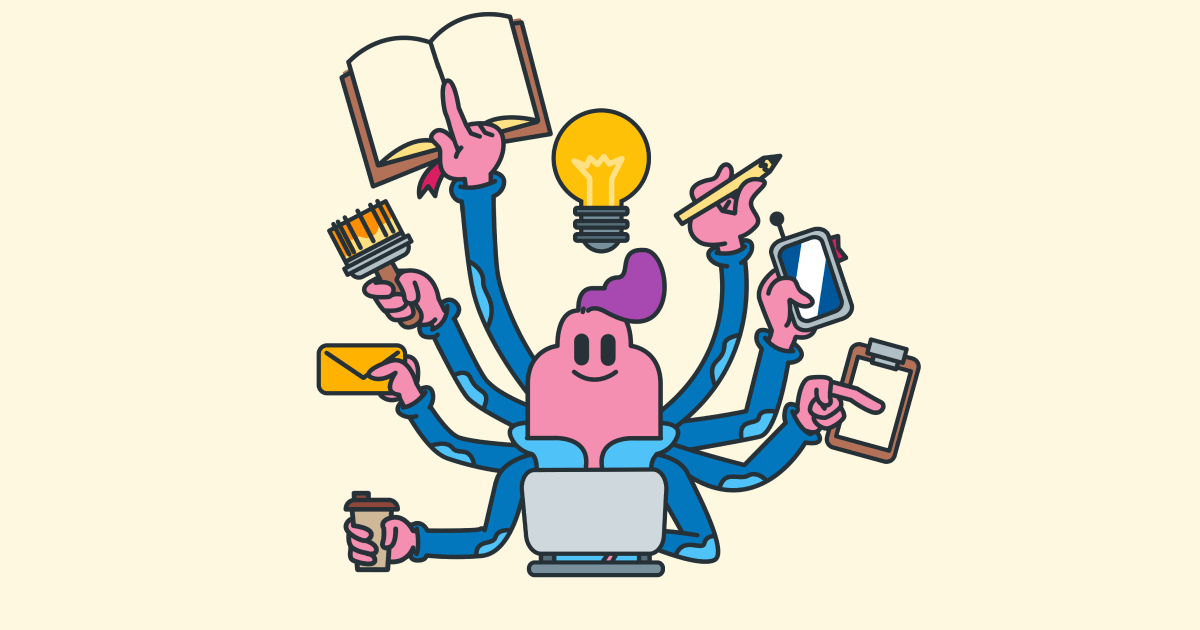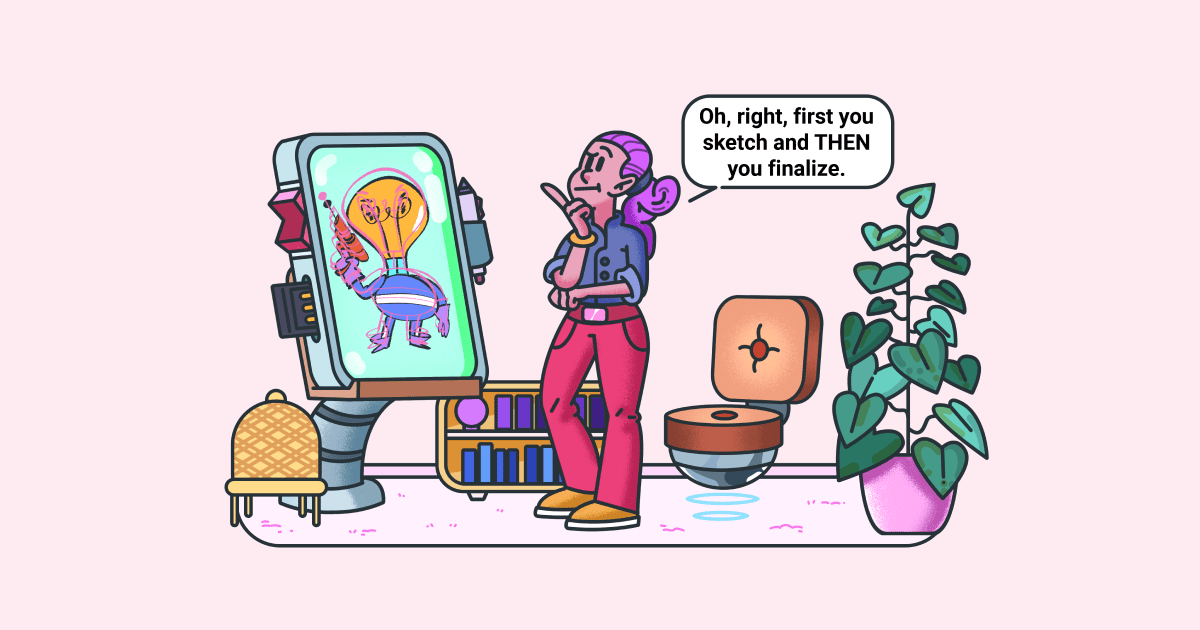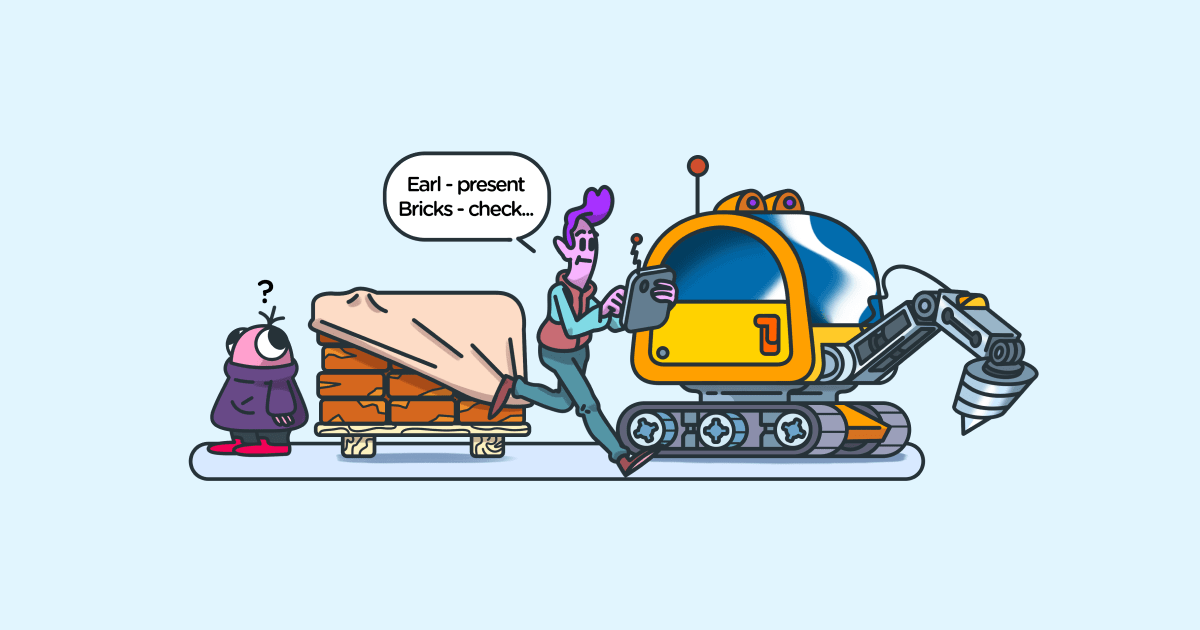15+ Practical ways to improve work performance
Last updated on: June 23, 2023
You want to get a raise, a promotion, or feel better about your work. Well, who doesn’t?
To get there, you first have to find ways to improve work performance — and impress your boss and coworkers in the process.
Yet, this endeavor seems impossible with all those attention-suckers getting in the way, including:
- Meetings,
- Minutiae,
- Rings, pings, dings, and the like.
So, how do you make it all go away and focus on your job performance? The honest answer is: you don’t!
But here I’ll show you a few ways to improve work performance by not being a jerk or missing out on what’s important, including how to:
- Increase performance despite obstacles,
- Learn to seek and give feedback, and
- Adapt to massive change.
Let’s rock’n’roll to see how you can become better at your job!

Table of Contents
Why is improving work performance important?
Work performance refers to the sum of behaviors of an employee in an organization, big or small. These behaviors can be:
- Positive,
- Negative, or
- A mix of both.
In any case, each behavior either contributes to or hinders the progress of company goals.
The way you behave and perform at work can lead you to:
- Get a promotion more quickly,
- Earn a bonus or a salary increase, or
- Gain anything else that you value.
Apart from the obvious, what other results can you achieve if you perform better at work?
Let’s dive right in!
Benefit #1: Better quality of work
An interesting 2023 research article by a group of researchers has found that you need to perform in a superior way to get a competitive advantage over other employees.
In fact, the same paper cites that work discipline and work motivation greatly influence employee productivity. We know, shocker!
Simply put, if you’re motivated, you’ll produce more high-quality work.
In turn, this process acts as a feedback loop — a cycle that feeds itself by repetition. In any case, one of the expected consequences of this behavior is the reduction of work-related errors. And who wouldn’t want that?
In a nutshell, when you address professional areas of improvement, you make everyone happier in the process, including:
- Your boss,
- Yourself, and
- Your clients.
If you adopt ways to improve work performance, you can even boost your sense of value. Let’s see how.
Benefit #2: Boost in sense of value
A Harvard Business Review article states that employees feel genuinely valued when they receive recognition from their boss. Still, plenty of bosses fail to deliver on this front for various reasons.
Today, more than ever, employees want to feel valued and appreciated at work. In other words, workers want to find out what satisfies them and makes them happy.
When employees perform at a top level, they get a boost in productivity and experience an enhanced sense of value. Simply put, they start to believe that their work truly matters.
💡 Clockify Pro Tip
Supercharge your productivity with a few dozen tried-and-tested techniques:
Benefit #3: Increase in employee well-being
Employee health and work performance are intertwined.
Interestingly, a 2021 study found that how employees perceive the value of their work greatly influences their mental health and physical well-being.
Moreover, the authors of the said study wrote that how people perceive the value of their work “significantly affects the physical and mental health of female, male, married, unmarried, religious, and nonreligious workers.”
So, everybody seems to benefit from the meaning they find in their work.
💡 Clockify Pro Tip
Learn more about how you to create a WHF environment that contributes to your health and productivity:
—
Now you understand the greatest benefits you can reap if you adopt some ways to improve work performance. But what are these ways? Stay tuned!
What are the top 3 ways to improve performance at work?
In creating this article, we talked to dozens of productivity and time management experts. Most of them agreed that we should all focus on 3 top ways to improve work performance. These 3 make up the most practical advice with a wide range of applications in real life — and you can implement them no matter your sector or workload.
So, excited to read the experts’ words of wisdom on how to improve yourself professionally?
Let’s dive right in!
Tip #1: Prioritize self-care
The first one’s easy! Just take care of yourself, your physical and mental well-being.
Let’s begin with the most underrated performance enhancer — sleep! Holistic productivity coach Jenna Piché says that your productive work depends on how much sleep you get:

“Sleep-deprived people come up with fewer original ideas and tend to stick with old strategies that may not continue to be effective. Keep yourself sharp by getting at least 7 hours of sleep each night. You can start this tonight by choosing a consistent bedtime and setting an alarm to remind you when it’s time to wind down.”
Furthermore, an expert in the field of hypnotherapy and neuro-linguistic programming, William Lam, says that mental health is part of the self-care puzzle. William claims you can refine how your brain operates with the help of advanced techniques:

“First, visualize tasks as opportunities instead of burdens. Second, consciously ‘unplug’ from work — a mental detox that refreshes and revitalizes cognitive abilities.”
Likewise, the communications manager at the non-profit organization United Planet, Mohammad Hijazi, says that neglecting breaks leads to poor results:

“Taking regular breaks is crucial for maintaining productivity. Pushing yourself without breaks leads to mental fatigue, diminishing creativity and productivity. Incorporate short breaks throughout the day to recharge and re-energize. Use these moments to relax, stretch, or engage in activities that help clear your mind.”
💡 Clockify Pro Tip
Read our expert-infused blog post to learn more about how to feel less mentally exhausted:
Tip #2: Stay organized
You want to get as much done as possible. But you need to know that not all tasks are created equal — sorry to break it to you!
Chief Human Resources Officer at Management.org, Steven Mostyn, thinks one of the best ways to improve work performance is to use the 80/20 rule:

“The 80/20 rule states that roughly 80% of your results come from 20% of your efforts. First, you have to identify the tasks or activities that contribute the most to your desired outcomes and prioritize them. Then, focus your energy and time on the most impactful tasks to maximize your productivity.”
For maximum performance improvement and staying organized, project manager Jared Hill says that you should ditch busywork at all costs:

“Avoid it like the plague. If it’s not impacting an area of importance for your leadership — ignore it. You get to focus on the stuff that matters and free up time and energy in the process.”
But knowing what tasks you need to get done is only one side of the coin. To that effect, the founder of Jotform, Aytekin Tank, thinks that automation is the secret sauce for staying organized:

“Years ago, I was drowning in work. I had just started my company and was in charge of HR, accounting, and even buying office supplies. So, I went on an automation rampage and started automating everything, from HR to emails. Learning how to automate my busywork took a long time but the amount of time it saved me in the long run was invaluable.”
💡 Clockify Pro Tip
Supercharge your organizational skills by planning your day to a T. Get a step-by-step guide in our blog post:
Tip #3: Eliminate distractions
A 2022 Gallup report suggests that 60% of people feel emotionally detached at their job, negatively impacting workplace efficiency. In fact, as many as 19% reported being miserable.
One of the reasons why people are scattered at work is the never-ending storm of distractions — digital and otherwise.
We asked productivity and e-learning consultant Janifer Wheeler what employees can do to improve work performance in this area. To answer our question, Janifer speaks to the importance of enjoying what you do as one of the best ways to improve work performance:

“Joy is the constant. If there is no joy in your work, why are you doing it?”
But what can you actually do to feel more upbeat?
For starters, another expert we talked to suggests eliminating distractions to improve the quality of work and cheer you up. Kenny Kline, president of the sports media agency BarBend, told us that we should all cap the number of intrusions on our time and attention:

“It’s impossible to get rid of distractions all the time. Instead, try setting up time in your calendar for focused work instead. Concentrate on the task at hand as you put your phone on silent, switch off any email alerts, and — if you have an office door — close it. You’re going to be shocked by how much you get done.”
💡 Clockify Pro Tip
Conquer those pesky distractions and get more done every day with our handpicked tips right here:
12 Tips on how to improve at work
When you look for ways to improve work performance, start small. Specifically, don’t try to do everything at once.
And if you’re interested to go all in on improving your work performance, you can implement the following pieces of sound advice.
Ready, set, go!
Tip #1: Develop a professional attitude
The first and one of the primary ways to improve work performance is to be professional. When you act professionally, others treat you with respect. Professional behavior can have a great influence on how your career develops.
But what does being professional entail? Here’s a shortlist:
- You’re polite and respectful — but assertive,
- You are dependable and your coworkers can rely on you,
- You are punctual and don’t miss deadlines,
- You are competent with your skill set,
- You ooze honesty and accountability,
- You respect the dress code, and
- You are aware of your company’s policies, visions, and values.
Try integrating these simple tips into your routine, and your coworkers will take you more seriously in the workplace. This is an easy step everyone can master and boost their productivity as a result.
We asked Jonathan Elster, the CEO of a company that provides logistics solutions to the e-commerce industry, to give us his 2 cents. Jonathan says that negativity can slip into your everyday work and affect your professionalism:

“It can be easy to get drawn into office gossip and before we know it, we are talking about someone, or adopting a negative attitude to the job. Allowing negativity to creep in will only allow it to take over so try to maintain positivity with those around you and focus on building strong communicative and collaborative relationships.”
💡 Clockify Pro Tip
Dive deeper into how you can evaluate your professional standing at work by conducting a performance review:
Tip #2: Find (creative) solutions to difficulties
When I read job openings, I often come across requirements such as “possessing problem-solving skills” and similar. In all truth, your job won’t run as smoothly as butter all the time, and the road to a successful career often gets bumpy.
So, among the critical things to improve on at work is — strong problem-solving skills, including how to deal with:
- Deadlines,
- Order changes, and
- Customer requirements.
Simply put, problem-solving is the ability to find the most effective and fruitful solutions to unexpected problems.
Newsflash: Your work quality will inevitably decline if you don’t laser-focus on this theme in your everyday performance.
For a more practical perspective, we talked to Ben Tibbits, Managing Director at a UK broadband comparison site. Ben said that you can add modern AI tools to your list of ways to improve work performance:

“Research can take endless hours, but by using ChatGPT you are able to gather insightful information that can be used as a base. The output can give you an overview of a subject, enabling you to delve further into a certain aspect or develop into your own content.”
💡 Clockify Pro Tip
Harness the power of online tools to increase your work quality instantly. Read about the best in our blog post:
Tip #3: Seek feedback
Feedback is the information we receive about ourselves to help us understand what we do well or poorly. Feedback can be direct such as “I was really impressed how you handled the issue X. You showed how you work under the pressure of deadlines and a lack of resources.” Or it can be indirect, as in non-verbal.
For example, suppose your supervisor or manager maintains little eye contact with you and keeps their arms folded, with eyes downcast. In this case, they are likely to be unsatisfied with your work or even not interested in your proposal.
On the other hand, here are a few non-verbal signs that you’re doing a good job:
- Firm handshake,
- Moderately pleased face, and
- Direct eye contact.
Digital PR Specialist at CAKE.com, Dunja Bošković, thinks it’s wise to let your manager or team leader know in advance that you want to request feedback, so both you and them can thoroughly prepare:

“Schedule a meeting with your supervisor. If you work remotely, you can first check your boss’s Google Calendar to see when they are available for a meeting. You can include a short description in the event to let them know what you want to get out of the meeting. But if you’re working in an office, you can get together with your manager one-on-one.”
I would add that it’s not always the most pleasant thing to ask for feedback, but you can reap notable benefits from requesting feedback at work.
In a nutshell, here are a few questions to politely ask to get feedback:
- What are the things you liked about my article/presentation/project?
- Would you be so kind as to elaborate on how I can improve my performance?
Tip #4: Learn to communicate better
Effective communication is crucial in every aspect of your life — and the workplace is no exception. So, another of the many ways to improve work performance is to learn how to communicate effortlessly.
On a business level, it’s the company’s job to:
- Encourage workplace communication using team collaboration apps, and
- Organize different events for team building, etc.
However, as an individual, you should be aware of the company’s policies and also do your best to:
- Communicate clearly and concisely. This includes real-time communication and answering phone calls and emails in a professional manner.
- Adjust your tone and communication to your company’s policies. For example, suppose your company encourages a more informal way of communication. That doesn’t mean you should persistently address people with “sir” or “madam” or go to the other extreme of “What’s up dude?”
Talent Acquisition Specialist at CAKE.com, Simo Jokić, argues that 2-directional communication is the path to success:

“We have to hear each other out if we want to foster successful communication. Ask questions if something is unclear, emphasize what’s important, highlight expectations, and be concise. Assertiveness is one of the critical preconditions for successful communication. When you transparently convey your needs, emotions and intentions, you create a healthy environment.”
💡 Clockify Pro Tip
Improve your team collaboration by understanding how and when to say ‘no’ to your coworkers — and even your boss:
Tip #5: Keep up with the news in your industry and company
This is one of the most underrated work skills to improve — you need to stay up to date with the latest trends in your niche.
For practicality’s sake, here are some of the ways to improve work performance in this area:
- Subscribe to blogs, YouTube channels, podcasts, and magazines where you can read and listen about the topics relevant to your industry.
- Network with your peers and mentors – know what others are up to by checking in with people relevant to your niche, preferably in person.
- Socialize – social media are a resource for real-time news. If there’s something important going on and you’re not there in person, social media is the next best thing.
Check in on what’s new once or twice a day. - Update your knowledge by attending seminars or webinars. They are one of the most effective and time-saving ways to keep up with the latest news and build knowledge.
We sat down with Peter Zendzian of IT company Zzservers to discuss how to improve the quality of work by choosing the frequency at which you want to stay on top of things:

“Be updated. This could be every week, month, or every day. This doesn’t mean I upgrade myself to bigger things, but it could be smaller changes as well. Suppose, following the latest business news and discussing it in daily meetings. This will help you analyze your firm’s take, the current rate of growth, and potential aspects in the future.”
So, stay on top of industry trends. Build your knowledge to be able to maintain meaningful conversations with your coworkers and boost your reputation. All this helps you perfect ways to improve work performance in a jiffy — we promise!
Tip #6: Track your time
Whether you are a working parent or you often feel overwhelmed and anxious about the workload, simple time tracking is coming to your rescue.
In a real-world scenario, tracking time helps you:
- Be more productive and overcome procrastination,
- Get a clear overview of how you spend time and make optimal schedules,
- Gather the data you need to make better time estimates,
- Learn what areas of your workflows need improvement, and
- Keep track of your work hours and avoid ending up overworked.
This is where technology comes in handy. You should opt for a reliable and easy-to-use application that doesn’t picture time tracking as an annoyance but as a process that bears fruit.
Talent Acquisition Specialist at CAKE.com, Milica Vuletić, says that time-tracking practices can be highly beneficial for enhancing your quality of work:

“Tracking time helps us become more conscious of how we allocate our time, allowing us to identify areas where we waste time and avoid them. Tracking time enables us to monitor our productivity, providing us with the opportunity to manage tasks and deadlines effectively, leading to better results in the end.”
To that effect, Clockify is a time-tracking tool that offers basic time-tracking features for unlimited users and projects.

When you track time regularly, you get a better sense of how much time you need for certain tasks. That way, you can learn when you’re most productive.
💡 Clockify Pro Tip
Whether you’re a beginner or a time-tracking wizard, get a head start with our guides on how to track time successfully:
Tip #7: Set milestones
Long and complicated projects are often overwhelming. They can make you lose track of your progress or make it seem like you haven’t achieved anything important despite your hard work.
As a cure, try to set milestones to create attainable project plans that better monitor the project’s progress.
But what are milestones?
Milestones are significant events or moments in a project that serve as reminders of all past achievements. Imagine a ladder where its rungs represent milestones.
In real life, important milestones during a person’s life include:
- Starting school,
- Finishing university,
- Getting a new job,
- Becoming a parent, etc.
We spoke to Marnix Broer, CEO of an educational tech company Studocu, to weigh in. He says that one of the best ways to improve work performance is to build a day-to-day inventory of the most critical items:

“Rather than starting multiple tasks, build a daily priority list and work through each task until completion. If a task can’t be completed in one day, set a specific milestone to hit before you set it aside and move on down your list.”
For illustration, here are some advantages of setting milestones at work as they:
- Give you a closer insight into your project’s progress,
- Highlight the end of key activities during a project,
- Serve as a great indicator of project success,
- Shift your attention to significant events or deliverables during a project, and
- Remind you of critical events or failures during a project.
Finally, you can supercharge your productivity by creating project timelines. This way, you get a visual breakdown of all elements during a project, including milestones. With a project timeline, you can easily track and record data in one place.
Tip #8: Learn something new every day
“I am still learning.” – Michelangelo, at the age of 87.
When he said this, Michelangelo was probably pondering ways to improve work performance.
But learning doesn’t have to be something related to your job per se — it can reflect your interests or even something about yourself. The thought behind learning is to keep expanding your mind and make you more confident.
The founder of an award-winning advertising services company, Erik Huberman, says that you can always learn from the latest trends or views from experts:

“Be a sponge. Soak up every piece of knowledge from people who have done more than you. I’ve always loved the quote, ‘If you are the smartest person in the room, you’re in the wrong room.’ I don’t know who that quote is attributed to, but doesn’t it motivate you?”
Starting today, you can learn a myriad of skills to improve on at work. Most importantly, find something that makes you feel motivated and boosts work performance, such as:
- Learning a new language or a software program,
- Improving your communication skills, and
- Enhancing your time management skill set.
In other words, improving job performance doesn’t have to be a hassle. In the end, you won’t be the only person to benefit — you’ll also gain a high reputation and respect from others.
So, next time you ask yourself, “How can I improve my work performance?”, note that learning something new every day is the fastest way to become a better employee.
💡 Clockify Pro Tip
Ever heard of the DiSSS and the CaFE methods? Check out this article to learn new skills using these 2 learning frameworks:
Tip #9: Embrace new opportunities
One of the most underrated ways to improve work performance is this: Welcome every opportunity like your long-lost friend who just won the lottery.
Some people believe that their personal attributes can change and develop if they make an effort. A 2022 research article suggests that people with a growth mindset tend to be more open-minded and adaptable to change. Specifically, individuals who believe their mindset is malleable can better adjust to their environment and make better decisions.
If you have a growth mindset, it means that you:
- Embrace challenges and see them as an opportunity to grow,
- Find inspiration and learn from the successes of others,
- Don’t let obstacles stop you from achieving goals,
- See effort as a path to mastery,
- Love learning new things, and
- Learn from criticism.
Having a malleable brain doesn’t come naturally but with hard work, education, and constantly adapting to changes.
For work purposes, an expert we mentioned earlier, Jared Hill, says that you need to immerse yourself in your manager’s problems and opportunities:

“A-players don’t need detailed instructions. They need clear objectives. Find out your boss’s pain points and biggest opportunities and help get positive results in those areas.”
💡 Clockify Pro Tip
Impress your boss and find out how to make sure you’re doing a good job — in this blog post:
Tip #10: Abandon your comfort zone
The authors of the book Limitless give extra attention to reality-altering. They believe it plays an important role in exiting your comfort zone.
Many people aren’t aware of their potential and live in a “mental prison.” Therefore, they choose to aim low due to their insecurities and fear of failure. Their low self-esteem makes them believe they’ll fail if they leave their comfort zone and try something new.
In contrast, altering your reality means you:
- Aim for higher goals,
- Embrace new opportunities with an open mind, and
- Don’t settle for average.
Success is not something that you can stumble upon. Bear in mind that the most successful people gained their success and wealth because they stepped out of their comfort zone.
💡 Clockify Pro Tip
Learn how insanely successful people implement powerful habits and routines to make the most of their days right here:
We spoke to Gauri Manglik of Instrumentl, a grant-seekers organization, about this topic. She told us that you must challenge yourself from time to time:

“Don’t let yourself get too comfortable with the status quo. Always strive for growth, both personally and professionally — even if it means taking risks or challenging yourself outside of your comfort zone!”
If you don’t leave your comfort zone, you will fail and you can’t grow.
Tip #11: Acknowledge (and work on) your weak spots
“Inspiration is a guest that doesn’t willingly visit the lazy.” – Tchaikovsky
One of the surprising ways to improve work performance is to become aware of everything you’re doing wrong. The next step is to make an effort to improve yourself in the areas you’re weak in. We know, we don’t like it either.
Jokes aside — growth is uncomfortable.
But here’s some insightful advice from Milica Vuletić at CAKE.com. She thinks that your work improvement and personal development can skyrocket if you recognize your weak spots:

“Steps you can take to enhance work performance include setting clear and specific goals with defined deadlines for completing specific tasks, avoiding multitasking, and actively seeking constructive feedback from colleagues to improve skills.”
If you can’t seem to finish everything on time and miss deadlines regularly, it’s time to think about your actions and turn your weaknesses into strengths.
Laura Vanderkam, the author of What the Most Successful People Do Before Breakfast, writes that thriving individuals score gains early while everyone else struggles to catch up:
“Before the rest of the world is eating breakfast, the most successful people have already scored daily victories that are advancing them toward the lives they want.”
So, maybe the problem why you don’t perform better lies in the fact that you don’t know your productive time and can’t seem to set your daily targets.
For example, some people — aka morning larks — perform better in the morning. Yet, others perform better at night — aka night owls.
So, discover your biological prime time to get the most out of your workday.
💡 Clockify Pro Tip
Read this article to discover your personality type and address your weak spots:
Tip #12: Adapt to change
“The only constant in life is change.” – Heraclitus
A “well, that’s the way I’ve always done it” mentality won’t get you far in a competitive workplace, especially in industries like IT, where things constantly ebb and flow.
Instead, implement tried-and-tested ways to improve work performance, like adapting to the never-ending changes in your environment.
On the top of your head, you can probably think of many businesses that had to close their doors because they failed to adapt.
For example, the video rental giant Blockbuster was a provider of home movie and video game services. They had an impressive number of movies and games, which made them better than their competition — until the market changed, and their business model didn’t.
In fact, on-demand streaming services such as Netflix were on the rise, but they refused to go digital — which resulted in slowly going out of business.
Another example is Polaroid and its instant film and cameras. They held the patent to their instant photography process, which was one of the contributing factors to their huge success. However, just like Blockbuster, they didn’t think that going digital was the right move, and Polaroid Corporation declared bankruptcy in 2001.
Whether you have your own business or you work in a company, keeping up with current technology trends and being open to change is essential. Not everyone can stay flexible and adaptable without losing their essence. But those who succeed in doing so make history.
Congrats, you’ve made it — that wraps up our 12 ways to improve work performance!
3 Things to avoid to stay productive
Now you’re equipped to impress your boss and coworkers since you know all the ways to improve work performance!
But what are some areas of improvement that you can benefit from if you — and get this — refrain from certain actions? Specifically, what can you stop doing to become more productive?
Like always, I’m so glad you asked — I’ll reveal 3 critical things you should avoid at all costs.
Let’s jump right in!
#1 Avoid switch-tasking
Multitasking, switch-tasking, context-switching — it goes by many names, but it’s more or less the same thing — switching between demanding tasks or trying to do them at the same time.
The short advice goes something like this — don’t.
William Lam says that multitasking can create poorer results overall:

“Do not over-rely on multitasking. Despite its popularity, it often leads to mistakes and hinders deep work.”
Likewise, a 2023 article by Saudi Arabian researchers highlights that many modern workers see multitasking as indispensable and as negatively impacting their well-being. The study included participants from a vast array of sectors, including teachers, project managers, and the army.
💡 Clockify Pro Tip
Yet, it is possible to be a multitasker to a certain extent. Explore ways to improve work performance by implementing a few multitasking tactics that actually work:
#2 Ban perfectionism
Perfectionism equals your best work, right? Wrong!
Perfectionism often stifles creativity and nips your productivity in the bud, so to speak.
A recent 2022 article published by a group of Polish researchers suggests that a perfectionistic work style often leads to burnout. In fact, the authors argue that a myriad of factors may influence perfectionistic tendencies, including economic, family, social, and others.
But what can you realistically do about it?
The founder of the Australian digital marketing agency CJ&CO, Casey Jones, emphasizes that striving to make everything flawless can result in subpar performance:

“Avoid over-the-top perfectionism to increase productivity and job performance. Although it’s great that perfectionists try to do things perfectly to the dot, it can also take too much time away.”
When on the lookout for ways to improve work performance, experts unanimously agree that perfectionism makes your life harder — not easier.
💡 Clockify Pro Tip
Discover everything you need to recognize, prevent, or address career burnout with our blog post:
#3 Skip wall-to-wall meetings
Studies have shown over and over again that meetings aren’t the best use of your valuable time. And you know it in your gut that’s true.
But if your gut feeling doesn’t suffice, a 2021 Microsoft study found that constant meetings cause enormous stress. In fact, the authors of the study note that back-to-back meetings aren’t sustainable in the long run — and decrease your ability to engage and focus.
Likewise, an expert we mentioned earlier, Jenna Piché, suggests that all-day meetings are the main culprit preventing you to become your most productive self:

“Evaluate which meetings you need to be in and which you might be able to send a proxy to. You could also try cutting the frequency of standing meetings and the time in each, i.e. 45 minutes instead of 60. Finally, you might cut update meetings by having team members send a video update that you can watch when you decide.”
💡 Clockify Pro Tip
When you have to jump on a call or get to the office for a meeting, you can still make those meet-ups effective. Learn how in our guide:
Final words: Enhance communication and organization to achieve optimal performance
The exact set of steps for excelling at work differs from job to job, even from industry to industry.
In a nutshell, we present you the most critical ways to improve work performance now:
- Be professional and find creative solutions,
- Enhance your communication skills,
- Get out of your comfort zone, and
- Adapt to changes quickly.
All these skills will pay off in the end.
Finally, bear in mind that even the smallest changes in your work routine can make a big difference in your life.
✉️ Which pieces of advice will you use to up your productivity? Are there any other ways to improve work performance that we missed? Write to us at blogfeedback@clockify.me for a chance to be included in this or one of our future blog posts. Also, if you liked this blog post, share it with someone you think might be interested in reading it.





